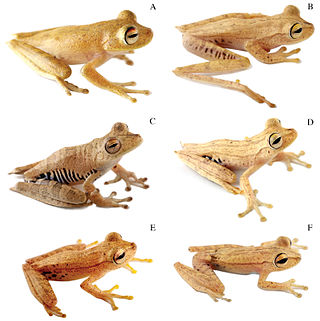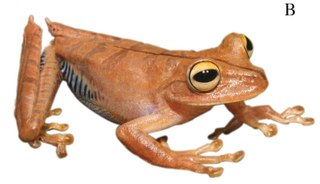
Osteocephalus is a genus of frogs, the slender-legged tree frogs, in the family Hylidae found in the Guianas, the Amazon Basin, Venezuela, Colombia, southeastern Brazil, and north-eastern Argentina. Males are warty, while females are smooth.

Boana is a genus of frogs in the family Hylidae. They are commonly known as gladiator frogs, gladiator treefrogs or Wagler Neotropical treefrogs. These frogs are distributed in the tropical Central and South America from Nicaragua to Argentina, as well as in the Caribbean.

Troschel's treefrog, also known as the blue-flanked treefrog or the convict treefrog, is a species of frog in the family Hylidae. It is found in most parts of the Amazon Basin including Suriname. Colombian, Guianan and Venezuelan records need confirmation.
Boana latistriata is a species of frog in the family Hylidae. It is endemic to Brazil and only known from its type locality, Itatiaia National Park, and from Marmelópolis, both in the state of Minas Gerais. The specific name latistriata refers to the wide stripes on the back of this frog.

The Imbabura tree frog is a species of frog in the family Hylidae found in the Pacific lowlands of western Colombia and northwestern Ecuador from the sea level to 1,000 m (3,300 ft) asl.

Boana semilineata is a species of frog in the family Hylidae that is endemic to Brazil. Its natural habitats are subtropical or tropical moist lowland forests, subtropical or tropical moist shrubland, freshwater lakes, freshwater marshes, intermittent freshwater marshes, pastureland, heavily degraded former forests, water storage areas, and ponds.
Boana nympha is a species of frog in the family Hylidae. It is endemic to the upper Amazon basin of southern Colombia, eastern Ecuador, and northeastern Peru; its range probably extends into adjacent western Brazil. The specific name nympha alludes to nymphs, beautiful wood- and marsh-dwelling goddesses in Greek mythology. Common name nympha Amazon treefrog has been proposed for it.

Hyloscirtus hillisi is a species of tree frog native to the Cordillera del Cóndor in Ecuador at elevations of 6,532 to 7,001 feet. The species is in danger of extinction.

Alfaro's tree frog is a frog in the family Hylidae. It is endemic to Brazil, Ecuador, and Colombia. Scientists think it may also live in Peru. Scientists have seen it between 176 and 350 meters above sea level.
The Canelos tree frog is a frog in the family Hylidae. It is endemic to Brazil, Ecuador, and Colombia. Scientists have seen it between 14 and 1050 meters above sea level.

Tetete's tree frog is a frog in the family Hylidae. It is endemic to Ecuador, Peru and Colombia. Scientists have seen it between 180 and 420 meters above sea level.

Scinax tsachila is a frog in the family Hylidae. It is endemic to Ecuador and probably also lives in Peru and Colombia. Scientists have seen from sea level to 1207 meters above sea level. It lives on the Pacific side of the contienent.
Boana cambui is a frog in the family Hylidae. It is endemic to Brazil. Scientists have seen it 905 meters above sea level.

Boana almendarizae, or Almendariz's tree frog, is a frog in the family Hylidae endemic to Ecuador. Scientists have seen it between 500 and 1950 meters above sea level in the Andes Mountains.
Boana ventrimaculata, The Yasuní tree frog, is a frog in the family Hylidae, endemic to Ecuador and Brazil. Scientists have seen it between 64 and 1035 meters above sea level.

The stained tree frog is a frog in the family Hylidae endemic to Ecuador, Colombia, and Peru. Scientists have seen it between 186 and 354 meters above sea level.
Boana icamiaba is a frog in the family Hylidae endemic to Brazil.
Boana bandeirantes is a frog in the family Hylidae, endemic to Brazil. Scientists have seen it only over 400 meters above sea level.
Boana aguilari is a frog in the family Hylidae, endemic to Peru. Scientists have seen it between 1225 and 2080 meters above sea level.
The tepui tree frog is a frog in the family Hylidae, endemic to Brazil and Venezuela. Scientists have seen it between 420 and 1800 meters above sea level.









